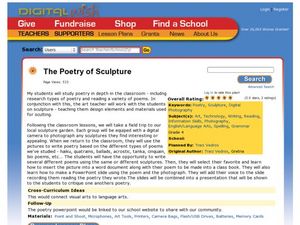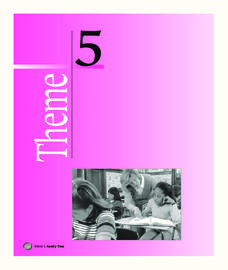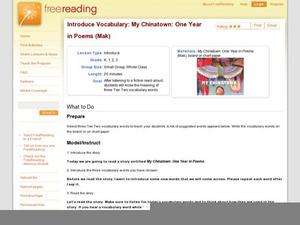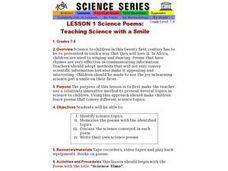Curated OER
Poetry Shared Reading
Students explore poetry. In this poetry lesson, students discover the qualities of good writing and the characteristics of poetry. Students practice reading poems in different ways. Studnets also discuss the mood of the poem and the...
Curated OER
Interpretation of Poems
Students recite poetry and analyze its meaning. For this poetry interpretation lesson, students listen to a poem and work in groups to write what the poem is about. Students share and discuss the poem. Groups report...
Curated OER
Poems That Work!
Students are introduced to the elements of poetry. As a class, they practice the correct way to read a poem and determine the author's audience. They identify similies and metaphors and determine the rhyme and meter. To end the...
Curated OER
The Poetry of Sculpture
Fourth graders practice writing poetry while examining all types of art. In this art analysis lesson, 4th graders participate in a field trip to a sculpture garden in which they view sculptures and create different forms of poetry...
Curated OER
Quirky Quatrain Poetry Lesson
Middle schoolers discover what a quatrain is, and are taught the three poetic devices: alliteration, hyperbole, and onomatopoeia. Everyone chooses a favorite hobby or activity, then attempts to write a poem about it. They must write two...
Curated OER
Hermeneutics: Teaching Students Author's Purpose
Your developing literary critics discuss 'perspective' and discuss how the same occurence can be interpreted by two different people in two different ways. They read Ryszard Kapuscinski's untitled poem, infer meaning of the poem, and...
Curated OER
What are the Elements of Poetry
Students read the poem "Ode to Pablo's Tennis Shoes" and analyze the form, figurative language, and mood. They complete a T-chart containing what they have learned about Pablo and the evidence from the poem supporting their conclusions.
Curated OER
Write a Harry Potter Script
Examine the technique of writing a script and complete a worksheet in which young writers summarize a favorite chapter in a Harry Potter book. They practice public speaking by acting out the summarization scenes for classmates. Handouts...
National Park Service
A Natural Resource Called Peace
Get your pupils outside and teach them about peace at the same time! Scholars create a list describing peace, hike outside, add to that list, and later create poems. The exercises support differentiation for your individual classes as...
Houghton Mifflin Harcourt
Family Time: English Language Development Lessons (Theme 5)
Support English language development with a family-themed unit consisting of a series of lessons designed to get your scholars moving, looking, speaking, writing, and listening. Conversation topics...
Newspaper in Education
The Iliad: A Young Reader Adventure
Is The Iliad part of your curriculum? Check out a resource that offers something for those new to teaching the classic and those with lots of experience using Homer's epic. Plot summaries, discussion questions, activities abound in...
Curated OER
Introduce Vocabulary: My Chinatown: One Year in Poems (Mak)
Beautiful illustrations and tender memories of cultural identity make Kam Mak's story My Chinatown an ideal resource for budding readers learning four vocabulary words in context: fortune, scraps,...
Reed Novel Studies
Winnie-The-Pooh: Novel Study
Winnie the Pooh lands in a gorse-bush plant in chapter one of A.A. Milne's beloved children's novel, Winnie-the-Pooh. With the novel study, scholars research three interesting facts about the plant. They also compose a four-line poem...
Curated OER
How to Diamond Poem (2+)
Ever heard of a "diamond poem" format? Neither had I, until I came across this lesson. Young writers are shown a format which results in a poem that comes out in the shape of a diamond! This is a simple, yet effective lesson.
Curated OER
Teaching Sequence of Activities
Students develop their skills at writing poetry by listening to poetry and using a model to emulate and write a poem. In this poetry writing lesson, students listen to Louis MacNeice's poem 'Prayer Before Birth' and use it to model their...
Curated OER
Poetry Alive! Interpreting Poetry Using Digital Images
Students investigate poetry by incorporating images into the words of a poem. In this language arts lesson, students discuss poetry writing devices and self expression with their classmates. Students create a film about the...
Curated OER
You Too Can Haiku: How to Write a Haiku
Students explore language arts by writing their own poems. In this haiku lesson, students investigate the Japanese culture and their beautiful music, poetry and art. Students count the syllables in every line of a haiku poem and write...
Curated OER
Life Cycle Poetry Worksheet
In this life cycle poetry worksheet, students read "La Grerue" by Sandy Hebert LaBry and reflect on the theme of traditional learning and teaching. Students further analyze the poem by answering 3 short answer questions that follow it.
Curated OER
Poetry Power
Second graders explore language arts by analyzing poems in their class. In this word play activity, 2nd graders define the terms rhyme, rhythm and alliteration and identify their uses. Students utilize class word lists to write their own...
Curated OER
Writing Places
Pupils brainstorm ideas after being read a poem and then are to write their own poem and read them out loud.
Curated OER
Spider Poems: The Spider and the Fly
Students review the information they gathered on different websites to write a poem about spiders. They use other websites to gain more information if needed. They share their poem with the class.
Curated OER
Power Poetry
Young scholars use poetic devices to discuss political issues. In this cultural diversity lesson, students listen to the president's State of the Union address and write poetic pieces that express their opinions about issues the...
Curated OER
Teaching Science with a Smile
Students study science concepts as they are presented in poetic form. They write and present their own science poems to parents during Open House.
Curated OER
Fact or Fantasy Writing
First graders see that some written text is for pleasure and enjoyment while some is for relaying information. They get to experience both types during the lesson. They brainstorm ideas for a story about a new kid in school to write about.

























